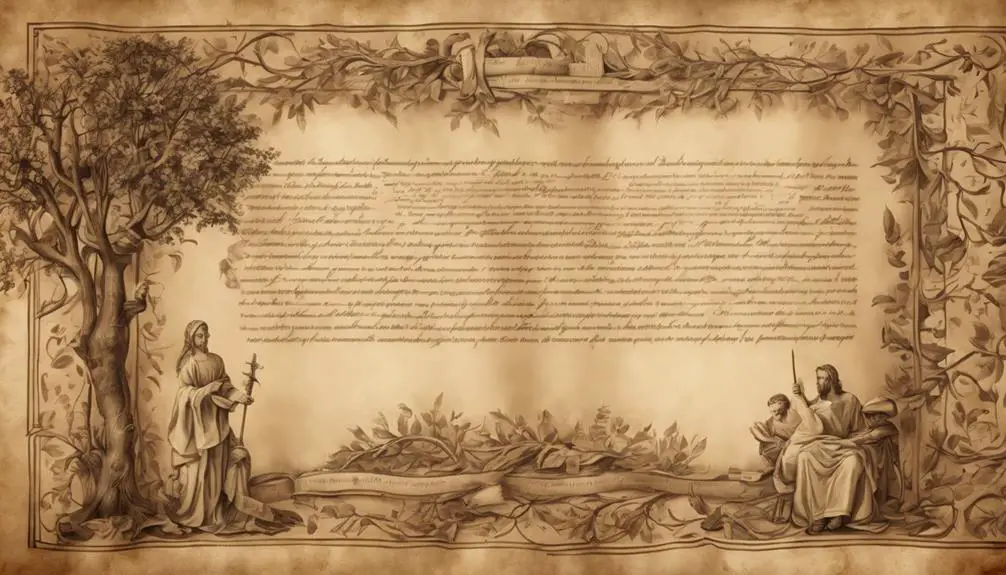Keep discovering the intriguing significance of lists in the Bible, an untapped source of spiritual and historical wisdom.

Lists in the Bible
Did you know that the Bible, a text of approximately 800,000 words, contains numerous lists?
From the Ten Commandments to the genealogical records, these lists serve as a way to disseminate moral, spiritual, and historical information.
You're probably familiar with some, such as the Seven Deadly Sins or the Fruits of the Spirit.
But have you ever wondered why these lists exist or what their significance might be?
There's much to uncover and discuss about these biblical compilations, so let's embark on this exploration together.
Key Takeaways
- The Bible contains various lists, each serving different purposes like ethical guidance, historical context, moral compass, and spiritual growth.
- Divine Lists, such as the Ten Commandments and Biblical Beatitudes, provide divine and moral guidelines for virtuous living.
- Historical lists, like Genealogical Lists, bridge biblical eras, highlight important lineages, and illustrate ethnic identities in biblical times.
- Lists like the Seven Deadly Sins and Fruits of the Spirit serve as moral and spiritual compasses for believers, influencing societal norms, legal systems, and personal growth.
The Ten Commandments: A Divine List

Why is the list of the Ten Commandments, etched into stone tablets according to biblical tradition, considered divine? It's primarily because they're perceived as direct instructions from God. They serve as Divine Guidelines, a blueprint for moral and ethical living.
The Ten Commandments aren't just a list, they represent a divine contract between God and His people. They're fundamental to the Abrahamic faiths, influencing societal norms and legal systems. But it's not just about the rules themselves, it's also about their interpretations. Commandment Interpretations are crucial for understanding these directives, as they provide context and relevance for contemporary life.
For instance, 'You shan't kill' is a clear directive, but its interpretation helps us understand it means not only physical harm but also emotional or spiritual harm. Similarly, 'You shan't steal' is interpreted to mean not taking anything that doesn't rightfully belong to you, including intangible things like someone's time or ideas.
Genealogical Lists in the Bible

Diving into the labyrinth of genealogical lists in the Bible, you'll discover an intricate web of family lineages that serve as crucial historical records, tracing the ancestry of significant biblical figures. These genealogies carry substantial ancestral implications, offering insight into the complex matrix of relationships that weave through the Old and New Testaments.
In analyzing these lists, you'll begin to appreciate their significance in three main ways:
- Historical Context: The genealogical lists provide a chronological framework, bridging the gap between biblical eras and grounding the narratives in a historical timeline.
- Ancestral Implications: They highlight the lineage of significant figures such as Abraham, David, and Jesus, showing how promises made to the forefathers are fulfilled in subsequent generations.
- Ethnic Lineages: These lists underscore the importance of ethnic identities in biblical times, illustrating the interconnectedness of different tribes and nations.
These genealogical records are more than mere lists of names. They're intricate tapestries, woven with threads of faith, history, and prophecy. They provide a detailed look at the familial relationships, ethnic lineages, and historical context that shape the biblical narrative. Through these lists, you'll gain a deeper understanding of the Bible's multifaceted narrative.
The Seven Deadly Sins: A Cautionary Catalog

Shifting your focus from genealogical records, you'll find another type of list in the Bible – the Seven Deadly Sins, a cautionary catalog that serves as a moral compass for believers. This enumeration represents seven fundamental vices, which, according to Christian teaching, lead to spiritual death if not addressed.
Sinful behaviors analysis reveals these seven deadly sins as Pride, Envy, Gluttony, Lust, Anger, Greed, and Sloth. Each sin represents a distinct form of moral decay, resonating with the human tendency to stray from righteousness. For example, Pride, often regarded as the most severe, is the excessive belief in one's own abilities, ignoring the grace of God. Contrastingly, Sloth is the avoidance of physical or spiritual work, which impedes spiritual growth.
This list serves as Christian moral guidance, outlining behaviors to avoid. It encourages believers to live a virtuous life, fostering growth in faith, humility, and charity. The Seven Deadly Sins, thus, aren't merely a list of prohibitions but a roadmap to spiritual maturity. They remind us that a life centered on God, rather than self, leads to a more fulfilling existence.
Biblical Beatitudes: A List of Blessings

In stark contrast to the Seven Deadly Sins, the Bible presents us with the Beatitudes, a list of eight blessings, which serve as a guide to living a life of virtue and spiritual prosperity. Found in Matthew 5:3-10, these guidelines exemplify the spiritual and moral values that Christ's followers should strive to embody.
The Beatitudes interpretation isn't merely moral directives; they're profound insights into the kingdom of heaven's principles. They convey a radical counter-cultural message, one that subverts societal norms and expectations. Here's a breakdown:
- Blessed are the poor in spirit.
- Blessed are those who mourn.
- Blessed are the meek.
Each of these Beatitudes celebrates attitudes and behaviors typically undervalued in society. The 'poor in spirit' refers to those who recognize their spiritual poverty and their need for God. Those who 'mourn' are comforted by the promise of God's justice. The 'meek' are those who choose humility and gentleness over aggression and dominance.
The Beatitudes' cultural influence is undeniable. They've shaped the ethics and values of Christian societies for centuries, challenging individuals to pursue a life of humility, mercy, and peace.
Fruits of the Spirit: A Spiritual Inventory

Continuing our exploration of spiritual guidance in the Bible, let's turn our attention to the 'Fruits of the Spirit', another pivotal list that presents a comprehensive inventory of qualities essential for spiritual growth and maturity. This inventory isn't simply a list, but a strategic roadmap for spiritual growth strategies, offering a concrete path to embodying divine love and wisdom.
Fruit of the Spirit |
Inventory Interpretation |
|---|---|
Love |
Unconditional, sacrificial love for others |
Joy |
Inner delight regardless of circumstances |
Peace |
Tranquility of spirit, absence of strife |
Patience |
Bearing with others in love, despite setbacks |
Kindness |
Compassionate, considerate behavior towards others |
These fruits aren't independent, but interconnected, each one enhancing and being enhanced by the others. They are the outgrowth of a life lived in alignment with the Spirit, a tangible sign of spiritual maturity. They're not achieved overnight, but are cultivated through persistent practice and commitment.
Frequently Asked Questions
How Are Lists Used in Other Religious Texts Apart From the Bible?
In other religious texts, comparative list analysis reveals similar uses to the Bible. You'll see list symbolism in religion frequently.
For instance, in the Quran, lists are used for ethical teachings, laws, and genealogy, much like the Bible.
In Hindu texts, lists of deities or virtues are common. These lists play a crucial role in conveying key religious principles and narratives, enhancing the text's depth and viewers' understanding.
What Is the Historical Significance of Lists in the Bible?
You're exploring the historical significance of list interpretations and the role of biblical archiving.
Such lists provide a structured way to understand complex biblical narratives and genealogies. They're not merely historical records, but tools for theological reflection.
These lists have played a vital role in maintaining continuity, preserving cultural identity, and shaping the spiritual journey of believers throughout history.
They're significant in studying the historical context and progression of biblical events.
Are There Any Discrepancies or Conflicts in the Lists Found Within the Bible?
Yes, you'll find discrepancies within the Bible's lists, leading to list interpretation controversies. These inconsistencies often arise from translation errors, scribing mistakes, or differing author perspectives.
The accuracy of biblical lists is a widely debated topic among scholars. Some view these discrepancies as evidence of human error in the Bible's creation, while others see them as opportunities to delve deeper into the text's historical and theological complexities.
How Have Biblical Lists Influenced Modern Literature and Culture?
Biblical list interpretations have significantly influenced modern culture and literature. You'll find their impact in sermons, where list usage is common, providing structure and offering clear points of reflection.
They've also shaped literature, creating archetypal patterns and themes. From the Ten Commandments to the Seven Deadly Sins, these lists provide a framework for moral and ethical discussions, deeply ingraining themselves in our societal fabric.
What Are the Differences Between the Lists in the Old Testament and New Testament?
You'll find differences in list structuring in the Old and New Testaments. Old Testament lists often reflect a societal or ceremonial order while New Testament lists are more focused on moral and spiritual guidance.
The importance of numerical order in biblical lists also varies, often symbolically significant in the Old Testament, while in the New Testament, order isn't as heavily emphasized.
Conclusion
In conclusion, you've explored various lists in the Bible, from the divine directives of the Ten Commandments to the spiritual inventory of the Fruits of the Spirit. These lists serve as crucial guidelines, genealogical records, cautionary tales, and blessings.
They not only shape the narrative of Biblical texts but also provide spiritual and moral guidance. Understanding these lists can deepen your comprehension of Biblical teachings and their application in everyday life.



Sign up